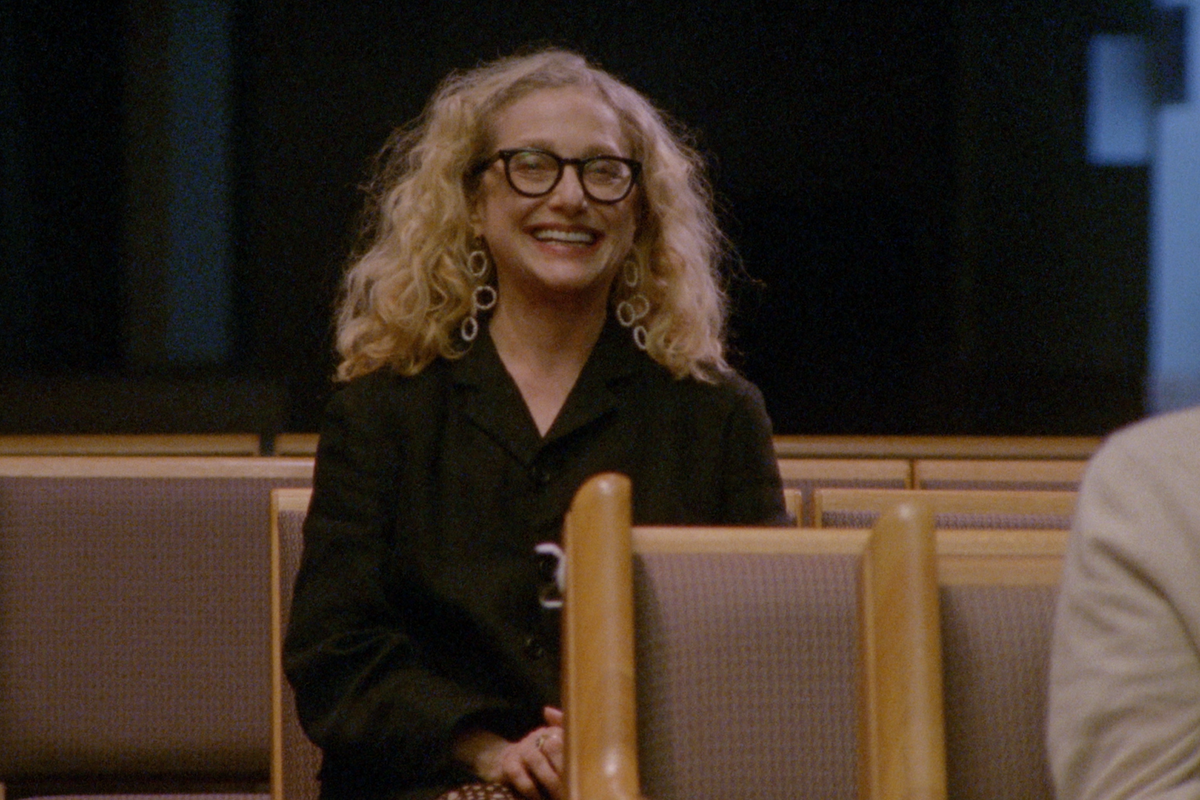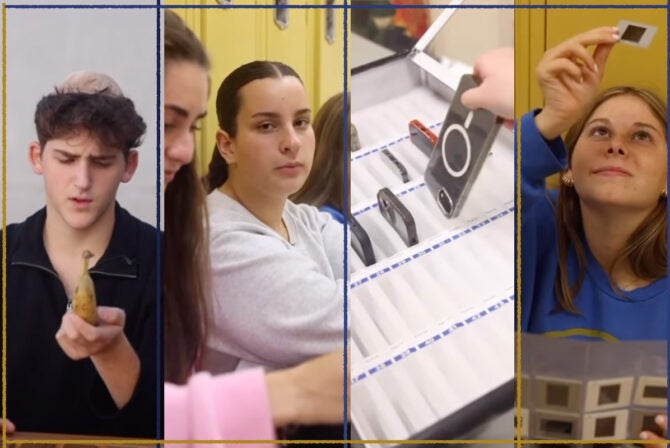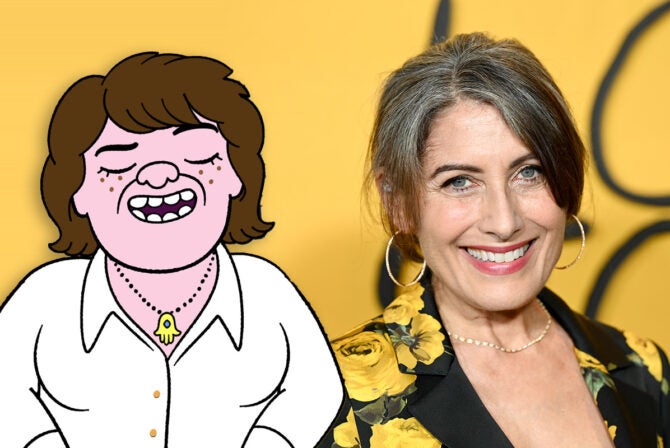In what is one of the most chaotic and delightful Shabbat dinner scenes I’ve ever witnessed, candles lit and table laden with Ashkenazi goodness, the guests play a game of telephone. It’s one of the central scenes of “Between the Temples,” a wonderfully alive indie rom-com about a cantor and his adult bat mitzvah student, and the game was an improvisation of sorts, inspired by actor Jason Schwartzman’s own games he plays with his three young kids, an endearing fact I discovered at the film’s Tribeca premiere. Like anyone in the throes of early love, Cantor Ben Gottlieb (Shwartzman) can’t wait to shout from the rooftop about how much he loves Carla (Carol Kane) and that love absolutely implodes out of him in the middle of this game, completely derailing what is already a truly unreal mess of intentions and schemes — with Ben’s two mothers trying to set him up with the rabbi’s daughter.
I was also brimming with love when I left East Village Cinemas after the screening. Brimming with love for Judaism, whose potential for healing and reinvention the movie captures perfectly. Brimming with love for Jewish and Israeli music — the movie’s soundtrack is full of so many songs that scored my youth, from Boaz Sharabi’s impeccable ballad “Pamela” to the mellifluous perfection of Arik Einstein and Miki Gavrielov’s voices in “Hi Tavo.” Brimming with love for Jewish family — the way Ben’s mom, played by Caroline Aaron (“The Marvelous Mrs. Maisel”), embodied the real love of a Jewish parent, embracing their child’s happiness no matter what. And maybe most importantly, I was brimming with love for cinema, a reminder of what it’s like to watch a movie that’s both great and challenging, a fast-paced film that’s so full of brilliant dialogue and movement, discombobulating close-up scenes and awkward, oh-s0-human moments, and a film that, like the ancient Jewish texts, leaves a lot of space for personal interpretation.
In the movie, Schwartzman’s Ben is a cantor in the midst of a terrible upheaval after the tragic, untimely death of his wife. He moves back in with his mothers and finds a job at their synagogue, but he’s lost not only the love of his life but the very core of his identity — his singing voice. Ben finds hope and music and love in his former music teacher, Carla O’Connor, played by a transcendent Carol Kane, who is funny and open and also, like Ben, trying to start anew. She is trying to find herself again as an older woman, no longer working as a music teacher; her husband has passed away and her son is grown and a father now himself. When Carla meets Ben again at a bar all these years later — after he gets into a brawl — she’s a celestial apparition who breathes light back into him almost immediately.
I’ve often longed for a beautiful, authentic, May-December romance in films. Age gap romance is so often murky and messy, abusive and salacious, as seen in films like “May December” (starring the wonderful Natalie Portman), and I can’t argue that there is value in portraying relationships with unfair power balances. But there are plenty of people in this world who are much younger or older than their significant others and who live in respectful loving relationships that let each partner flourish and grow. I know that not everyone will see Carla and Ben’s relationship as romantic — and that’s the magic of an indie movie like this — but I choose to see them as lovers, and it truly filled me with joy. I saw in them what true love is — kind and open, joyful, that which surprises you and helps you grow into yourself and expand.
At the Q&A following the screening in Tribeca, director Nathan Silver shared that he was interested in how people break these patterns and cycles that they’re caught in. We see that Ben has been caught in relationships with sexy, larger-than-life women, both played by Madeline Weinstein: his deceased wife, Ruth, a celebrated author of risqué nonfiction, and the rabbi’s troubled daughter, Gabby, who fetishizes him as a sexy cantor (yes, this movie is part of the new hot Jewish clergymen phenomena) more than really sees him for who he is. But in Carla, Ben finds someone who, despite their age difference, can see him, grow with him, laugh with him, help him find the flavor of life through treyf burgers, music and mushroom trips, and share a sense of wonder and discovery.
I love that is was a coming-of-age tale for two people who are much older and world-weary than usual. But I also just love Carla, a woman who reminds us that we can always grow into ourselves more and more. Kane said it was her own mother, Joy, who inspired her in this role, who had the courage to reinvent herself at age 55, moving to Paris by herself and becoming “admired and known as a master teacher of something called Dalcroze eurhythmics and jazz improv,” Kane recalled in an interview. “She even was hired by the French government to teach in one of their schools.”
When Ben meets Carla, she doesn’t even know what the word cantor means. She’s a red diaper baby, she explains to him later, the daughter of Jews from the former Soviet Union who raised her without religion. On her 13th birthday, all she got was that first terrible rite of passage for a woman, the return of that promise God made Eve that “in hardship shall you bear children” — that is, her period (this was a detail that hit too close to home for me, as I too got my period on my 12th birthday, on the day of my bat mitzvah “party”). Just like Kane herself, who performed many Jewish rituals and rites of passage onscreen as an adult, playing diverse and incredible Jewish women, Carla finds a way to Judaism as a grown woman, thanks to this enchanted meeting with Ben at the bar. And she also finds someone who doesn’t see her new “impulsive” dream as just another quirk, who takes her seriously, who is willing to go to bat for her because he sees in her a manifestation of what it really means to be Jewish.
It’s been 100 years since the first bat mitzvah, and way less time since the Jewish rite of passage really became a staple among girls (and now, nonbinary individuals), and still many girls don’t go up and read the Torah like Carla wants to on her bat mitzvah day. While watching I thought about the fact that I never got to chant from the Torah. I thought about how Carla, like every great Jewish matriarch, carved a space for herself that felt right within her Jewish tradition.
Of course, not everybody sees the Jewish beauty that I found in this film. I’ve seen arguments that the characters are unlikable, and in some cases — like Rabbi Bruce (Robert Smigel,) who seems to be beholden to the synagogue donations, and Judith (Dolly De Leon,) an interfering Jewish mom who constantly tries to matchmake her son — harmful Jewish stereotypes at a fraught time for Jews in America. But I love these characters for the little twists that they take on those traditional stereotypes. Rabbi Bruce has a love of golf and a tie patterned with the faces of his kids and a patience and generosity toward Ben. Judith’s love for Judaism may go a little too deep, and she can be a little too inflexible, but that still comes from a place of devotion and affection for the religion she found as an adult. The characters of the “Beyond the Temples” all have parts in them that seem irredeemable. Ben and Carla do, too. And yet the beauty of the movie is that they find a kind of redemption in each other.
Some rom-coms end with a wedding, but this one ends with a bat mitzvah. We hear Carla, that red diaper baby, take ownership of her Jewish life — and of her joy — alone, with Ben, in the covenant of nature, also so central to Jewish tradition. You can almost feel the coolness of the day, can almost smell the grass and the earth. There’s something completely transporting about the scene.
It might feel cheesy to say that “Between the Temples” is about tikkun olam, healing the world, but sometimes that idea is synonymous with healing ourselves. When we show the world that we believe we are worthy of being loved, we show others that they are, too. When I left the cinema after the screening, I did feel healed. I felt an uncomplicated and pure love for all the things that I am, as a Jew, as a grown adult with the capacity for learning and change, as a person who is always asking questions, always open to the possibility of growth.








